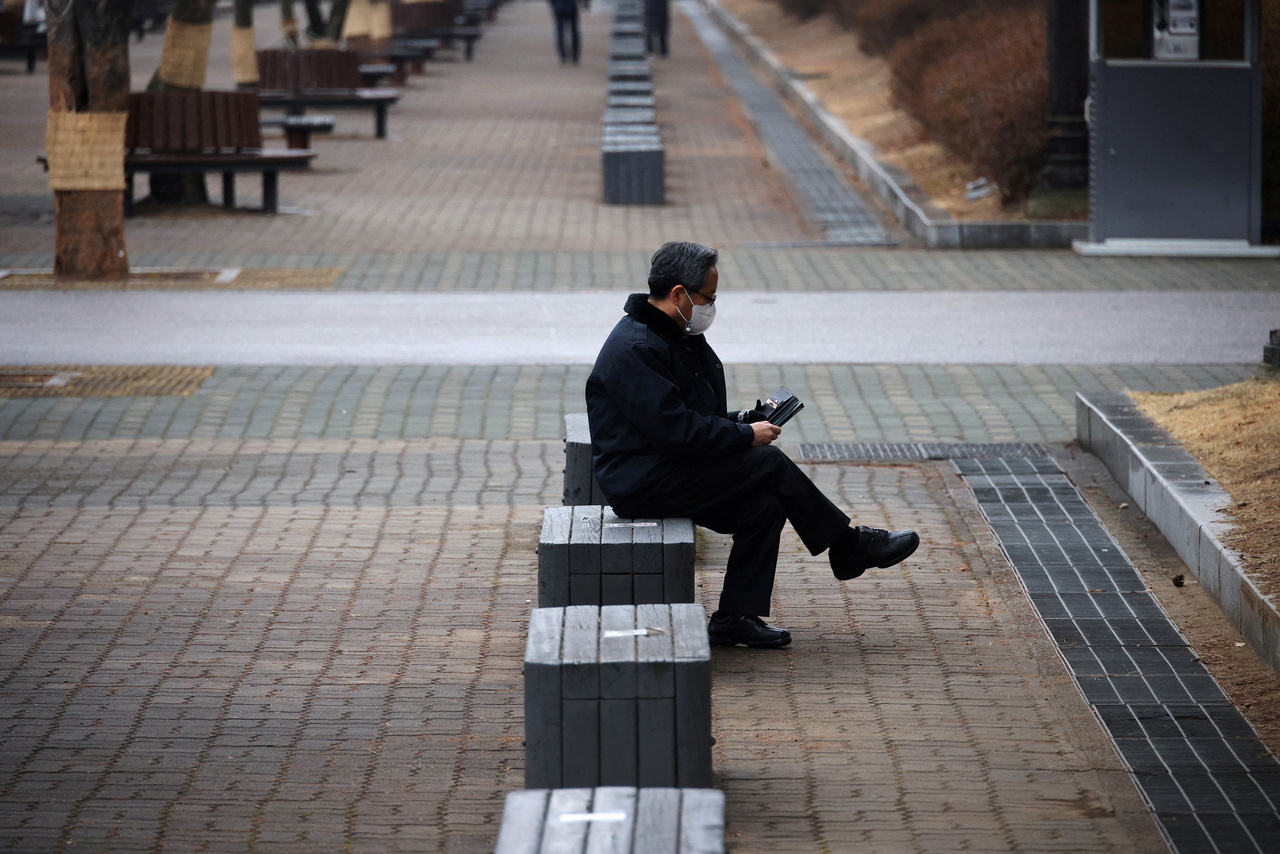The Asian Voice
'The Lost Generation' in the electronic era: Korea Herald contributor
Sign up now: Get insights on Asia's fast-moving developments

A man rests at an empty park in Seoul on Jan 25, 2022.
PHOTO: REUTERS
SEOUL (THE KOREA HERALD/ASIA NEWS NETWORK) - Back when I lived in the US pursuing an advanced degree in the 1970s, Americans frequently exchanged a salutary "Hi!" or "Hello!" when they passed by on the street, even if they were total strangers.
Even today, when a baby wakes up in the morning, American parents teach the baby how to greet, by saying "Hi!" with a bright smile. Surely, such warm and friendly greetings, among other things, made Americans among the friendliest people in the world.
However, things have changed today. In 2019, when I returned to the US to teach at the University of California, Irvine, I noticed that young Americans seldom greeted each other on campus or on the street. Of course, older Americans still said "Hi!" when they were passing by. Yet, young people in America no longer seemed to be interested in greeting passersby.
Soon, I found out the reason. While walking, young Americans were always listening to music through earphones or staring at their smartphones, texting or Googling busily. It was as if they were half-deaf and half-blind due to these things. It is only natural, therefore, that they do not or cannot greet passersby.
Today, smartphones have become indispensable for young people. For them, a smartphone is like a palm computer. So they do everything with it, such as texting, sending emails, internet banking, ticketing, listening to music, taking a photo, reading newspapers, watching movies, to name but a few things.
For the younger generation today, a smartphone is like an "American Express Card" as it was known in the 1960s and 1970s, advertised with the famous phrase: "Don't leave home without it."
By contrast, older people are not very good with smartphones or computers. With smartphones, they merely make phone calls, text on Kakao Talk or read news at best. Many older people do not even know how to obtain an online quarantine pass or set up a QR code, which is a prerequisite to entering a restaurant or a cafe.
When something is wrong with their smartphone or computer, older people become helpless. In the eyes of youngsters, therefore, older people, who are clumsy with their smartphones or computers, are pathetic and even despicable.
Before computers and smartphones became ubiquitous, the generation gap often came down to a difference in thinking or political opinion, such as conservatism and liberalism.
Today, the generation gap has become rather technical, such as clashes between computer-whiz youngsters and computer-blind oldies called "commaeng." Since everything is computer-related these days, there is no connection between the two age groups. To the younger generation, the computer-blind older generation is nothing but an extinct species.
Unaware of such radical social change, some older people still try to edify young people, saying frequently, "When I was your age," or "Natte neun maria," thereby earning the derogatory nickname, "Latte."
In addition to the similar pronunciation of "Natte" and "Latte," presumably the connotation is; "It is absurd for a Latte to try to teach a black Americano the real flavor of coffee." Nevertheless, young people should try to learn valuable lessons from history that the older generation went through.
The other day, my ballpoint pen ran out of ink. Thus, I drove to Target to buy a refill. At the stationery section, I found out that manufacturers no longer make refills.
When their ballpoint pen runs out of ink, young people just throw it away and buy a new one, instead of looking for refills because ballpoint pens are cheap. Besides, younger people seldom use a pen these days, as their fingers on a touchpad or a keyboard have replaced these traditional writing implements.
However, questions arose; what if my ballpoint pen is a famous brand? What if it is a precious one inherited from my father? What if the pen is embedded with sweet memories? Then, I definitely need a refill because I cannot throw it away simply because refills are not available. Likewise, the older generation is not disposable, even though they are not skilful at computers or smartphones.
Today, the older generation is hopelessly becoming an object of mockery by the younger generation. Older people are derided partly because they are clumsy at technology and partly because they try to advise technology-oriented young people who think they are smarter than older ones.
Young people never seem to realise that they, too, will grow old and fade away some day. In that sense, the soundtrack lyric of the 1968 film, "Romeo and Juliet," is illuminating, "A rose will bloom/ It then will fade/ So does a youth/ So does the fairest maid."
The younger generation should know that older people, too, were once young and beautiful. You cannot deride or despise older people simply because they are not good at computer technology or try to teach you the past. These days, young Koreans in their twenties, who are discontent with their social milieu, call themselves the Lost Generation. In this high-tech electronic era, however, older people are the Lost Generation.
- Kim Seong-kon is a professor emeritus of English at Seoul National University and a visiting scholar at Dartmouth College. The Korea Herald is a member of The Straits Times media partner Asia News Network, an alliance of 23 news media organisations.


